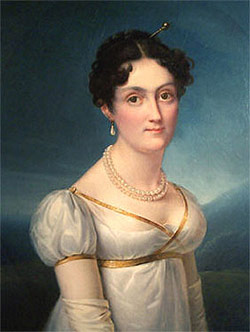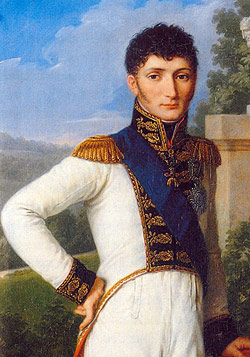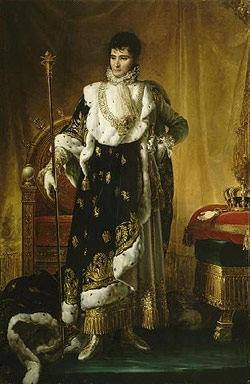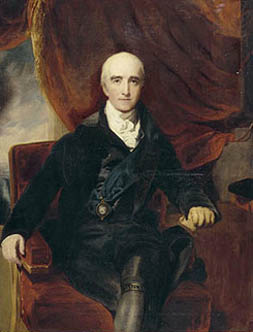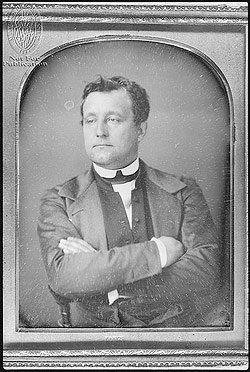STRANGE BUT TRUE:
RELATED BY MARRIAGE TO NAPOLEON
It came as a great shock to discover not do long ago that I was actually related by marriage to Napoleon. I don’t like Napoleon, but here is the story.
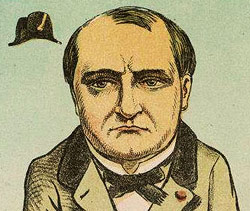
For those who, like myself, have from time to time looked into the bizarre connections which can exist between people as a result of either blood relation or marriage, there are some surprises which can arise which are truly astonishing. The greatest surprises are the ones which one finds concerning distant relations, whether by blood or by marriage. Suddenly one can find one is connected in some bizarre way with some notable character from history, who might be a hero or a monster. But as monsters are more common than heroes, one sometimes has a nasty surprise. And what a relief it is then to take refuge in the comfort that a traceable association with a monster is only by marriage, and that thank goodness one is not related to him by blood. Such a monster was Napoleon Bonaparte, for whom I have always had the utmost contempt as a megalomaniac and a mass murderer. Imagine my horror when I discovered that I actually had a connection with him! And imagine equally my relief when I was able to comfort myself with the realization that it was only through marriage. Here are the bizarre details:
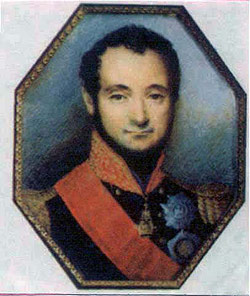
My second cousin five times removed was named Elizabeth Galbraith Patterson (born 6 February 1785, in Baltimore, Maryland, USA). She and I are both descended from James Kyle, who was my six-times-great-grandfather, who was from Belfast and County Tyrone in Northern Ireland (though the family earlier came from Ayrshire in Scotland) and emigrated to East Donegal Township just north of Lancaster, Pennsylvania, in America. (From James Kyle’s older brother or uncle, who did not emigrate, is believed to be descended, through his mother, the Rev. Ian Kyle Paiseley, MP, who was until recently the leader of the Democratic Unionist Party of Northern Ireland.) Elizabeth’s uncle, also descended from the Kyles, was Pennsylvania Chief Justice John Bannister Gibson (1780-1853), who I suppose would thus be my first cousin five times removed. In the autumn of 1803, Elizabeth met Captain Jerome Bonaparte, the younger brother of Napoleon, at a ball at the house of Samuel Chase, a distinguished public figure of those days. She and Jerome fell in love and, after some difficulties, married.
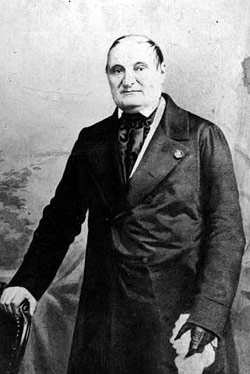
Napoleon was furious and had the marriage annulled by the French State, which of course he controlled. (No abuse of power there, surely!) Napoleon wished to marry off all his relations to the royal families of Europe, and was not amused that some upstart American girl, who was not even a duchess, much less a princess, had stolen his eligible younger brother. Jerome and Elizabeth set sail for France to dispute this, with Elizabeth heavily pregnant. When they arrived at France, Napoleon’s soldiers refused to allow her to disembark, so her husband did so and made his way to Paris, while Elizabeth took refuge in London to await events. There, in Clerkenwell (only 15 minutes’ walk from my London office), she gave birth to her son, Jerome Napoleon Bonaparte (born 7 July 1805).
The elder Jerome was persuaded to abandon his wife and child in return for being made a general, an admiral, a prince, and finally King of Westphalia. The Pope dissolved the marriage with Elizabeth Patterson, and Jerome then married Catherine, Princess of Wurtemburg. So Jerome, when subjected to the intense pressure which his domineering older brother and the combined Establishment were able to bring to bear upon him, turned out to be a real creep.
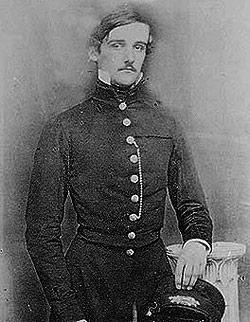
Meanwhile Elizabeth and her son returned to America, where the young Jerome married an American girl, Susan May Williams, and largely turned his back on the Old World, though he made desultory efforts over the years to gain some recognition as a Bonaparte. No male descendants of the young Jerome survived, but there were many descendants on the female side. Elizabeth died 6 February 1879 at Baltimore, without knowing that a hero was to come. Her son had predeceased her, having died at Baltimore on 17 June 1870. He left two sons, one who had no issue, and the other whose daughter married Count Adam von Moltke-Huitfeld (1864-1944), and they have many descendants alive today, though I have never encountered any of them.
Another mysterious coincidence is that at the Battle of Waterloo, where the French forces were commanded by Napoleon of course, and a division was commanded by Jerome Bonaparte, the English side was as everyone knows commanded by the Duke of Wellington. And Wellington’s older brother Richard, the first Marquess Wellesley, married as his second wife Marianne Caton Patterson, the widow of Elizabeth Patterson’s brother, another of my second cousins five times removed. It seems that for the Bonapartes, there was simply no getting away from those pesky Pattersons, even on the battlefield, where they managed to insinuate themselves remotely in this way. We thus have the historical irony that His Majesty Field Marshal Jerome Bonaparte, commanding a division at Waterloo, was the brother-in-law once removed of the Duke of Wellington, and Napoleon himself was thus the brother-in-law twice removed of Wellington. It’s what is known as ‘keeping it all in the family.’
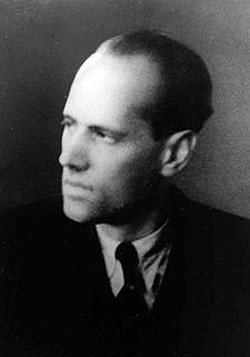
The hero who descended from this strange story was Count Helmuth James von Moltke, a modern direct descendant of Jerome and Elizabeth, who led anti-Nazi resistance in Germany. Thus we find the triumph of good blood over bad blood!
(It was his relative, another Count von Moltke, who had been Chief of the General Staff to the Kaiser in the First World War, but that is too depressing to dwell upon.) I am very pleased to think that I am extremely distantly related to an anti-Nazi hero, and I derive much more comfort from that fact than Barack Obama and Dick Cheney do at knowing that they are distantly related in a similar fashion, considering that they hate each other so much!
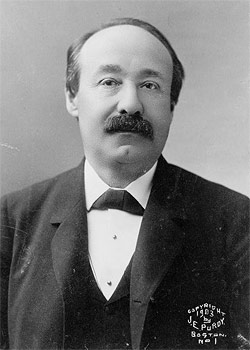
A FOOTNOTE TO THIS STORY: Elizabeth and Jerome’s grandson was Charles Joseph Bonaparte. He was born June 9, 1851, and died June 28, 1921. He became Secretary of the Navy under President Teddy Roosevelt in 1905, and then from 1906 until the end of Roosevelt’s period in office in 1909, he was Attorney General of the United States. He had a legal background, having graduated from Harvard Law School, then became a Harvard University overseer, practiced law in Baltimore, and did many other worthy things. From 1904 he became Chairman of the National Civil Service Reform League. I am very proud to say that this distant cousin as Attorney General was a trust-buster and that he broke up the tobacco monopoly in the United States. Since I am a passionate hater of cigarettes and smoking, anything anybody does against the tobacco companies is good news, and it greatly endears this man to me. But here is the strangest thing of all about Charles Bonaparte: he actually founded the FBI! That was in 1908, when it was called the Bureau of Investigation, adding the word ‘Federal’ later. I think that most Americans would be absolutely astounded if they realized that the FBI, which is considered ‘as American as apple pie’, was founded by the great-nephew of Napoleon Bonaparte, a French dictator. You won’t ever read that in the school history books! During the period a few years ago when the French became very unpopular in America, to the extent that ‘French fries’ were renamed ‘Liberty fries’, and nobody would eat French cheese or drink French wine, it would have been hilarious if some newspaper had pointed out that the FBI was created by Napoleon’s great-nephew. It is a pity that Charles had no children, as they would have been an interesting brood. As it is, the only direct descendants of these ‘American Bonaparte’ distant cousins of mine are the German von Moltkes, whom I have already mentioned. I do have friends who know some of them, who say they are very pleasant people, but I have never met any of them myself.
